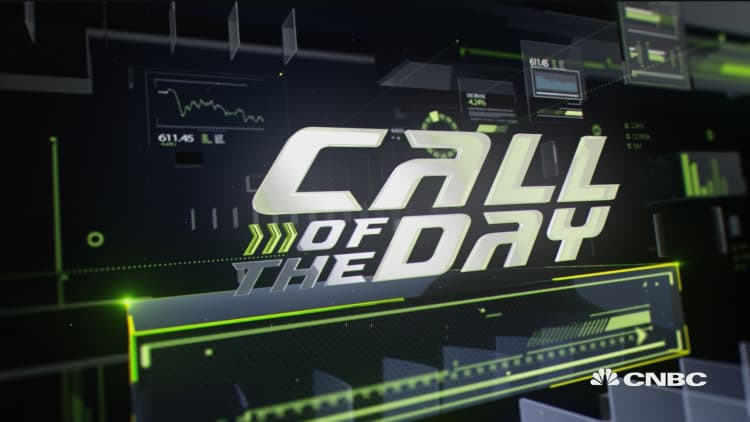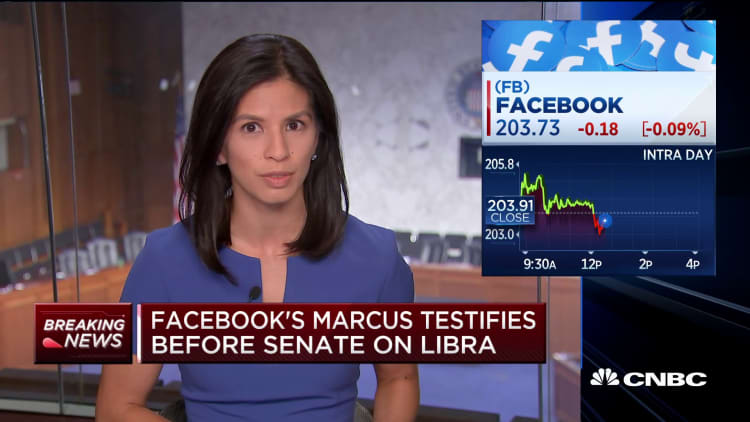
Facebook may be facing ever growing criticism on issues from data privacy to antitrust concerns, but Kevin O'Leary, chairman of O'Shares ETFs, remains bullish on the stock. He's "owned it through all this political crapola and noise," and he thinks you should, too.
O'Leary called Facebook a "fantastic business for entrepreneurs in America" on Tuesday's "Halftime Report." Nowadays Facebook may be more often criticized for being a large monopoly that should be broken up, but O'Leary explains, "I spend millions of dollars on Facebook each year across over 50 companies because we can geo-lock our message to specific markets at different prices. No one else can do that for me. Others try; they're the best."
These ad-targeting capabilities are why O'Leary predicts that despite all the political pushback Facebook is now facing, the company "is not going to get shut down, because it helps American business."
Libra, Facebook's proposed cryptocurrency set to debut in 2020, is the other reason O'Leary still likes the company.
O'Leary's bullishness on Libra might be surprising because he is a critic of bitcoin, arguably the most famous cryptocurrency known in part for its lack of regulation. But O'Leary argues that effective regulation could be the big difference that will make Libra a legitimate and useful currency.

"The reason I hate bitcoin is that it doesn't solve any problems unless I'm a criminal, a thief, a drug dealer, or I want to get around the rules. I don't want to do that. I don't want to support that." Bitcoin users do not need to entrust any third parties with money or information to make transactions.
Unlike bitcoin and other cryptocurrencies, Libra's value will be tied to government-backed fiat currencies like the U.S. dollar, thus making it more stable. Users will be able to convert their Libra tokens into dollars, for example, using an exchange rate.
Furthermore, "there's no inherent value" in bitcoin, argues O'Leary. Known for being volatile, bitcoin has dropped to $9,300, down more than 30% from last week. O'Leary predicts, "It's going to go to zero one day when somebody brings a regulated product, which is why I'm excited about Facebook. I like their chances."
It remains to be seen whether Libra will be regulated effectively. Opposition on many fronts is brewing against Facebook's new project: U.S. Treasury Secretary Steven Mnuchin and Federal Reserve Chairman Jerome Powell have both expressed "serious concerns" over the proposed currency, especially related to issues such as money laundering, financial stability and regulation.
In a Senate hearing on Tuesday, lawmakers grilled Facebook's David Marcus, the head of the digital currency project, on the plans for Libra. Marcus maintained that Libra will be independently regulated by Switzerland's data protection agency, but the regulator said in a statement to CNBC that Facebook hasn't reached out to them yet.
If Libra is rolled out effectively, it will solve a big problem O'Leary faces now as an investor: the lack of smooth international connectivity. To demonstrate Libra's usefulness, he proposed, "I want to go long on Canada... I want to buy a Canadian index, like XIU [iShares S&P/TSX 60 Index ETF]. I had to move out millions of dollars and convert it into Canadian [dollars]. What a pain in the hiney that was, as every FX trader tried to clip me for 20 bps" in commissions.
But "if I had something like [Libra] that was working and regulated, I could take $5 million, stick it in this payment system, and buy equities in there because it is a regulated payment system." Without having to pay extra fees or work across different systems, O'Leary would be able to easily invest across borders. He says: "Let me do it in Europe, let me do it in China, let me do it in Switzerland."
O'Leary's biggest need: "Give me a common currency that's regulated by government and let me go to work as an investor." Unlike those who think bitcoin is the answer, O'Leary has higher hopes for Libra, and thus Facebook as well.




